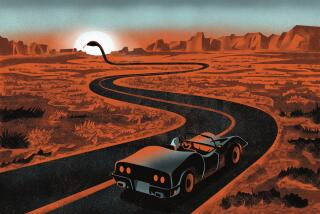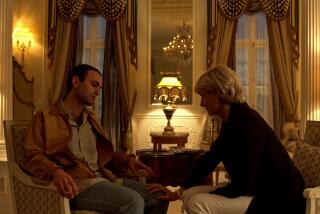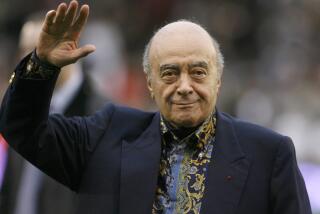Swain Was Wealthy, Worldly--and an Outsider
- Share via
LONDON — If there was a suitor who could offer Princess Diana some privacy and peace of mind in the style to which she was accustomed, it was Dodi Fayed.
The son of the Egyptian self-made billionaire who owns the Harrods department store, Dodi had bodyguards and private planes. He had the use of 11 luxury homes from Manhattan to the French Riviera. And he got $100,000 a month from his father.
When the 41-year-old playboy began courting Diana this summer and whisked her to the Mediterranean on his father’s 190-foot yacht, a friend of his said: “He sees himself as Aristotle Onassis and Diana as his Jackie O.”
Diana apparently felt the same way. “I think Di understands why Jackie Kennedy married Onassis,” the Daily Mail’s royal watcher, Richard Kay, wrote at the time. “There was this extraordinary circus around her, and he offered the opportunity to get away from it.”
Their deaths in a Paris car crash as they were fleeing photographers early Sunday shattered that protective cocoon. The accident also brought a tragic twist to the often painful story of an immigrant family’s rise to extraordinary prominence--but not full acceptance--in British upper-class society.
In many ways, Dodi and his father were viewed here as Onassis-like characters, super-rich outsiders in Camelot.
Mohammed Fayed, the son of a schoolteacher, was born in Egypt 63 years ago. He added an “Al” in front of his last name to imply noble background--a decision that was to haunt him in Britain. Through a combination of shrewdness, connections and luck, he struck it rich in the oil business before moving here in the early 1970s.
*
Dodi, born in Alexandria, Egypt, was the only child of Mohammed Fayed’s marriage to the late Samira Khashoggi, the sister of billionaire arms dealer Adnan Khashoggi. The boy grew up in a world of jet-set privilege, shuttling between family homes in Egypt and France.
He attended the exclusive Swiss school Le Rosey and did a short stint at the Royal Military Academy. Later, he worked briefly as an attache at the United Arab Emirates Embassy in London.
He also became a fixture on the London nightclub scene, a lover of fast cars and beautiful women.
“He was a chick magnet,” Andrew Wainrib, an old friend who used to barhop with Dodi, told a British TV interviewer last month. “To get a girl, I don’t think there are any limits on his extravagances, whether it is chartering a plane or getting on a boat. He would go to any port.”
Other acquaintances described Dodi as a dark, curly-haired Hugh Hefner. He “collected celebrities” as well as women, they said, and sat back quietly at his own lavish parties to watch them have a good time. His guest lists included actors Tony Curtis, Ryan O’Neal, Farrah Fawcett and Brooke Shields.
Oddly, for a man with wealth, Dodi often failed to pay for the clubs and mansions he rented for these bashes. In Beverly Hills, he leased a series of mansions for prices ranging from $20,000 to $35,000 a month and was sued repeatedly for stiffing the landlords with nonpayment or bounced checks.
In London and Hollywood, he worked in movie production, co-financing the Academy Award-winning British film “Chariots of Fire” along with the not-so-successful “Hook,” “The World According to Garp” and “F/X.”
“He wasn’t exactly a serious producer,” said Derek Malcolm, film critic of the British newspaper the Guardian. “He was a dabbler. He loved being around the celebrities. He didn’t have much else to do.”
He was even less involved in business with his father, who has never designated a family heir to run the store. A Harrods spokesman said Dodi spent about a third of his time on “product development” for the store, but the spokesman couldn’t think of a specific product he developed. “He had an office in the store but never walked around as if he were the owner’s son,” the spokesman said.
Dodi’s eight-month marriage to Suzanne Gregard, a onetime American model, ended amicably in 1987.
Another model, Kelly Fisher, claimed last month that she had given up a lucrative career, at his insistence, to marry him, only to be spurned for Diana.
Meanwhile, the playboy’s father was becoming a pillar of British society.
He bought Harrods, the venerable humor magazine Punch, the Scottish castle of Clan Ross and a number of other emblems of empire. He employed 5,000 people, steered major investment into Britain and once averted a national currency crisis by persuading his friend the sultan of Brunei to keep billions of pounds rather than convert them into dollars.
*
Harrods gave him an in with Buckingham Palace. The store has four warrants, one from each of the members of the royal family allowed to issue such social seals of approval: Queen Elizabeth II, Prince Philip, the Queen Mother and Prince Charles. Fayed also sponsors the annual Royal Windsor Horse Show, where he has shared the queen’s box.
But Fayed’s 1985 purchase of Harrods for $900 million was also to bring him discredit and prevent him from achieving one goal that had eluded him--British citizenship.
Roland W. Rowland, a politically powerful rival, also coveted the department store. After the purchase, he denounced Fayed as “the hero from zero” and persuaded the Department of Trade and Industry to investigate the Egyptian’s background and financing.
In a report that did not affect ownership of the store, the department concluded in 1990 that Fayed had lied about his origins, “practiced deception on a grand scale” and changed his name. The report was cited in 1994 when the government rejected his application for British citizenship.
“It was a terribly British way of doing things,” said Paul Goodman, a commentator at Britain’s Daily Telegraph. “It was a battle between the establishment, with its accepted British ways of doing things, and a charismatic outsider who busted in.”
While acknowledging that he had altered some minor facts about his life when he was buying Harrods, Fayed accused the Conservative government of former Prime Minister John Major of racism and began a no-holds-barred campaign to clear his name.
When the campaign came to nothing, he disclosed that he had bribed a string of officials to help him pursue it. Three Cabinet ministers resigned in disgrace, and the scandal helped bring down Major’s government this year.
Many who know him believe that the vengeful Fayed had more than just his son’s romantic feelings in mind when he invited Diana to vacation with his family in the south of France in July.
*
Dodi and Diana had met 10 years earlier--when his polo team beat Prince Charles’ team in a match at Windsor Great Park--but there was no hint of romance until that vacation. Then, after Di turned up last month on the Fayed yacht, British papers began reporting that the elder Fayed was eager to see the couple married.
“There’s no evidence that he was discouraging the idea,” Goodman said, noting the royal family’s unease over the relationship. “He would have seen the angles as well as anyone. It was a fantastic way, I suppose, for him of slapping the so-called establishment in the face.”
More to Read
Sign up for Essential California
The most important California stories and recommendations in your inbox every morning.
You may occasionally receive promotional content from the Los Angeles Times.












